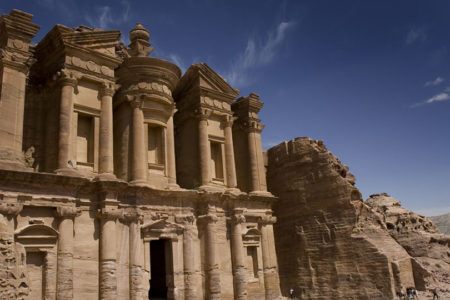‘I Will Come Again’
Late in Jesus’ ministry He began to speak to His disciples of “coming again.” Indeed, other than a somewhat cryptic parable concerning a man who went away to receive a kingdom (Lk. 19:11–28, spoken at Passover when Jesus would die), Jesus said virtually nothing about a Second Coming.
So it must have been somewhat startling when, on the night before He died, He spoke about it to His disciples. In the upper room on the western hill of Jerusalem, after Judas had departed to fetch the Sanhedrinists and soldiers who would arrest Him, Jesus, for the first time, explicitly and compassionately told the faithful 11 apostles that He was going away and would “come again”:
Let not your heart be troubled; you believe in God, believe also in Me. In My Father’s house are many mansions; if it were not so, I would have told you. I go to prepare a place for you. And if I go and prepare a place for you, I will come again and receive you to Myself; that where I am, there you may be also (Jn. 14:1–3).
In the context of first-century Jewish culture, His words would have been recognized as wedding talk. Marriage ceremonies involved two stages: the betrothal and the wedding. At the betrothal, the bride-groom’s family paid a dowry, and the couple exchanged vows; thus they became legally bound to one another as husband and wife. The wedding itself did not occur until months later at a time generally determined by the bridegroom’s father.
During the betrothal period, the couple remained separated (Mary, the mother of Jesus, spent the time with Elizabeth in the Judean hill country, Lk. 1:39–45); and both bride and bridegroom had well-defined responsibilities. The bridegroom was to prepare a home for his bride in the midst of his family or clan. That is, he would make a place where the new couple could live in the shadow of his father.
Indeed, one of the expressions for marriage in that culture was “adding a room to your father’s tent.” On the other hand, the bride was to keep herself pure and make herself beautiful for her husband.
The actual wedding was simple, though much celebrated. The bride-groom would go to his betrothed’s home and fetch her to the home he had prepared. Along the way there would be a wedding “parade” that would include great merrymaking and rejoicing and, depending on the families’ wealth, special features like musicians and poets to extemporize on the beauty of the bride.
When the wedding party arrived at the home the bridegroom had prepared, there would be a wedding feast to celebrate the happy occasion. There was no ceremony or exchange of vows; that had been done at the betrothal.
The essence of the wedding was simply that the bridegroom would return and receive his bride so that where he was, she might be always.
No occasion in all of Jewish culture was more a cause for rejoicing and celebration than a wedding. Thus it is appropriate that Jesus pictured Himself as a Bridegroom who betrothed Himself to the disciples, assuring them that He was going to prepare a place and would certainly return to fetch them.
It is difficult to conceive of a more winsome, loving, or comforting way in which Jesus might have communicated the promise of His return. Thus He prefaced it with the tender words, Let not your heart be troubled.
But there is another dimension to Jesus’ words that is little appreciated, yet tremendously significant. The culture of Jesus’ day was very much a clan culture. Jewish people lived in extended families (clans) that grew as sons eventually brought home brides.
Further, those extended families carefully watched over one another. Each clan was functionally led by a patriarch—a “ruling father” (pater/archos) who was ultimately responsible for the clan’s health and vitality. In the New Testament era, Rome ruled over all the land; political and military concerns were not left to individual clans. But daily life and welfare were very much clan functions.
When family members turned a daughter over as a bride to be cared for by her new husband, they were not so much entrusting her to the man as to his family, his clan—and, specifically, to the clan’s patriarch/father. Families sought out clans that were large, strong, and well established—all of which bespeak a wise and dependable patriarch. A family could happily and confidently entrust its treasured daughter to a bridegroom with a good father.
Jesus’ disciples were anxious for Him to inaugurate His promised Kingdom, but He spoke again and again of dying (cf. Lk. 13:31–34). They had haltingly bowed the knee to Jesus’ claim to be the Son of God, one with the Father in essence but distinct from the Father in person and role.
Then, in the upper room, He spoke as a loving bridegroom might speak vows of fidelity and comfort to his bride. In essence, He reminded them of the infinitely glorious “clan” into which they had married and of the eternally dependable character of the “clan’s” Father. Think through those precious words again from John 14:1–3:
Let not your heart be troubled; you believe in God, believe also in Me. [That is, all of the history of your people has taught you that you can trust Yahweh God. He is My Father! Even though I am telling you things you do not want to hear, you have learned to trust My Father, and you can trust Me as well.] In My Father’s house are many mansions; [My Father rules over a vast and strong household; He has proven Himself to be a wise and careful Patriarch.] if it were not so, I would have told you. [If there were any reason at all to doubt His strength and wisdom, I would have told you of that. But, in fact, He is worthy of your trust—even if some of what I have said to you causes you concern.] I go to prepare a place for you. [I am going away; and as a faithful Bridegroom, I will make ready a home where we can dwell in the shadow of My loving and powerful Father.] And if I go and prepare a place for you, I will come again [as does every husband who has purchased a bride for himself] and receive you to Myself; that where I am, there you may be also.
Those words are for us as well. We, too, wait for the fulfillment of that promise. And as we wait, there is much to confuse and discourage us. Well might we today, in the midst of all the moral chaos and seeming meaninglessness of history as it unfolds around us, ponder and embrace the loving promise of our heavenly Bridegroom who has purchased us to be His Bride, and whose all-wise Father will determine the appropriate time for the wedding feast.







